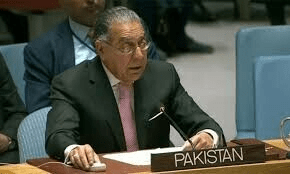WHY do we write? Because we want to communicate, says Steven Roger Fischer in his book A History of Writing. Terry Tempest Williams, the American author, puts it differently in WritingCreative Nonfiction, “I write to discover. I write to uncover. I write to meet my ghosts. I write to begin a dialogue.”
And George Orwell, the author of classics such as 1984 and Animal Farm, has another answer, “I write because there is some lie that I want to expose, some fact to which I want to draw attention, and my initial concern is to get a hearing.”
But ask Abdullah, aged three-and-a-half years, why he writes. His answer put simply would be — not in so many words though — “I am ready and now I want to write.” The profundity of this answer might escape many adults, especially mothers, who unwittingly become the worst enemies of their children when they push them deeper into their studies to make super achievers out of them.
But the fact is that a child does best when his growth and development in the formative phase are allowed to follow their own natural pace. You can create an enabling environment for him but you cannot force the pace.
Dr Maria Montessori, that great reader of the human mind, writes in The Absorbent Mind that the hands are connected with mental life and the hands' activities are stimulated by the mind. Hence teaching a child to write before he is ready for it and does it spontaneously amounts to forcing the development of his hand and also his mind.
Is that advisable? According to the Montessori philosophy, “To be able to do a thing without any help from others this is independence. If it exists the child can progress rapidly; if it does not his progress will be slow.” That is why Dr Montessori strongly disapproved of extending excessive help to a child. Let him follow his own impulse. When he has prepared himself at nature's urging he starts doing things without any help — and correctly.
A teacher/mother who tries to expedite the process of writing — holding a child's hand to teach him how to hold the pencil amounts to that — causes incalculable damage to the child's mental and emotional growth.
Farida Akbar, the head of the Montessori Teachers Training Centre, the only fully qualified trainer of Montessori directresses in Pakistan and accredited by the AMI (Amsterdam), says that since birth a child's mind and body are preparing themselves for the writing skill.
This is a long natural process. He needs to develop muscular strength and control, eye-hand coordination, concentration, ability to move the wrist in different directions, the lightness of touch and a wide range of vocabulary so necessary for the very complex act of writing. And when a child reaches that stage, he will pick up a pencil and write spontaneously as Abdullah was doing when Salma Imtiaz, incharge, Montessori Children's Centre, conducted me through the school where I saw him at work.
What fascinated me was this child's unbelievable concentration. He was deeply engrossed in his work and did not look up when I entered and sat next to him. And this was just the beginning. It will take him another year or so before he will fully master the art of writing for life.
While listening to a lecture by Ms Imtiaz to a class of bright and enthusiastic would-be Montessori directresses, it dawned on me how little is the understanding shown by our formal school system of a child's natural development. The general misconception that is widely promoted by schools is that the more you expedite a child's growth the more he will learn and achieve in life.
But Montessori teachers tell me that forcing a child to start writing at an early age before he is ready for it is the biggest disservice that parents do to their offspring. This forced learning stresses the child tremendously — many relapse into bed-wetting while others develop a clear aversion to school. The shortcut methods actually act as obstacles to the child's development. It is not surprising that a common complaint is that our students have short attention spans.
Studies have proved that children who have been allowed to grow at their own pace exploring their own potentials have done infinitely better in life. Orwell writes, “I wrote my first poem at the age of four or five, my mother taking it down to dictation.” She was a wise woman. She didn't thrust a pencil in his hand and force him to write it himself.
The education system as it has emerged in Pakistan under the education sector reform recognises in principle the importance of early childhood education for age three to five years. The National Education Policy 2009 while recognising and reinforcing this new approach logically recommends that primary education be started at age six — a sensible proposition that should unburden the child
somewhat in those vital early years that are crucial to his growth and development. But success depends on two factors. Honest implementation and the pedagogic system adopted.
One feels sceptical. Even highly educated parents are trapped in the viciously competitive and ill-informed system we have today. The educationists have no inkling of a child's growth process. Had they known, would the high-end, highly rated elite schools be demanding that the child be able to write when he comes for admission at the age of three?
Since teachers do not educate parents — who are treated as clients who are always right — they lack understanding and demand tangible progress in their child, attaching no significance to the subtle changes taking place inside his mind that are not visible to the naked eye but are in preparation for the 'language explosion' that is to come later.
Parents are impatient. It is time for them to slow down and rediscover their child's childhood, as a seminar on early childhood development organised by the Sindh Education Foundation in 2006 had advised.
zubeidam2@gmail.com











































Dear visitor, the comments section is undergoing an overhaul and will return soon.